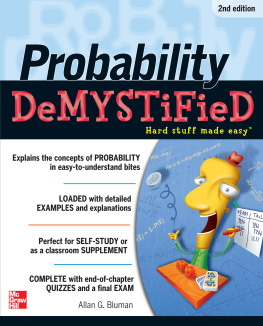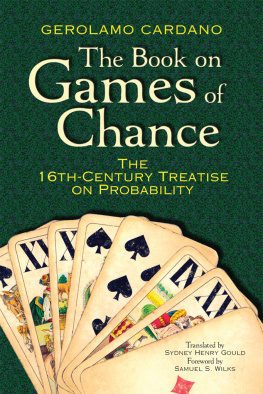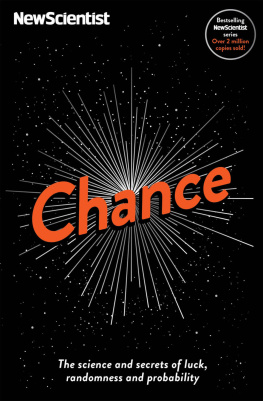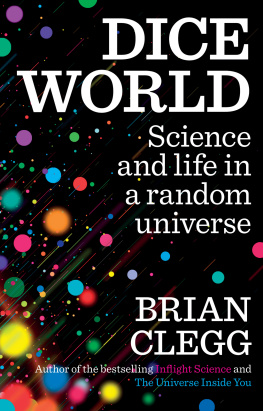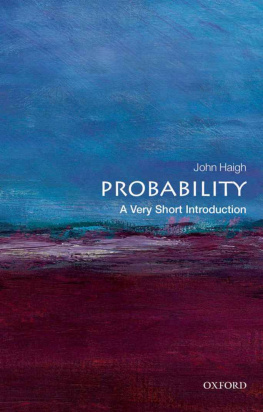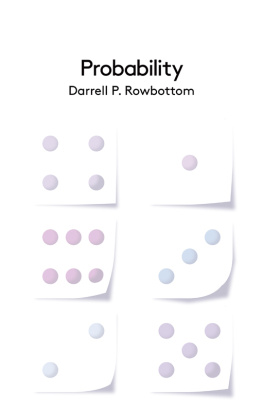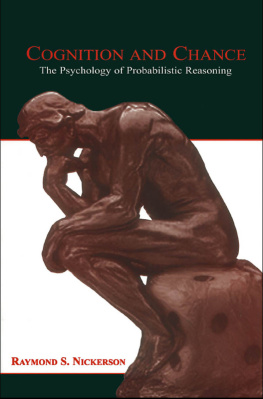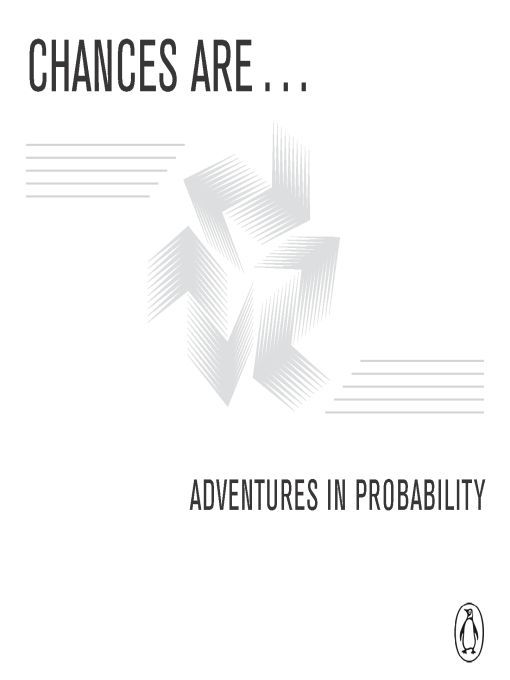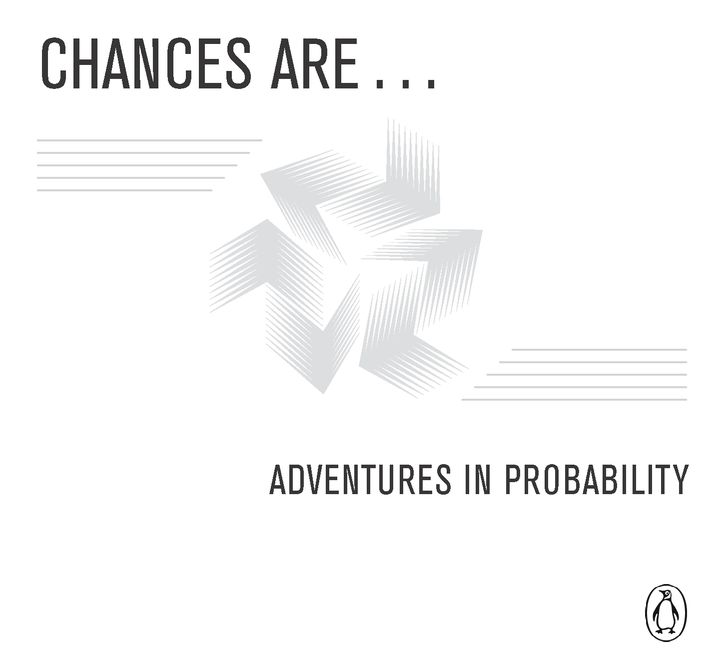Table of Contents
PENGUIN BOOKS
CHANCES ARE...
Michael Kaplan studied European history at Harvard and Oxford. After a stint as producer/director at WGBH, he has been an award-winning writer and filmmaker for corporations, governments, museums, and charities. He lives near Edinburgh, Scotland, with his wife and son.
Ellen Kaplan trained as a classical archaeologist and has taught math, biology, Greek, Latin, and history. She and her husband, Robert, run the Math Circle, a nonprofit foundation dedicated to joyous participatory learning, and are the authors of The Art of the Infinite.
Michael Kaplan and Ellen Kaplan | Penguin Books
To Jane, who likes probability,
Bob, who likes chance,
and Felix, who likes risk
Acknowledgments
We live in wonderful times, where shared interests can make new friends instantly across the globe. We want most of all to thank the many people who agreed to be interviewed for this book, or who offered their particular expertise in person or by telephone, letter, or e-mail. We came to regard the enthusiastic help of strangers as one certainty in an uncertain world.
Peter Ginna, friend to both generations, provided the impetus that set the work going. Each of us relied to such a degree on the talents available in our own homes that this should be considered the work of an extended family.
Rick Kot and his associates at Viking saw the manuscript through to its final form with enthusiasm, professionalism, and dispatch. They, like the others, helped give the book its virtues; its faults are ours alone
Thinking
The present is a fleeting moment, the past is no more; and our prospect of futurity is dark and doubtful. This day may possibly be my last: but the laws of probability, so true in general, so fallacious in particular, still allow about fifteen years.
Gibbon, Memoirs
We search for certainty and call what we find destiny. Everything is possible, yet only one thing happenswe live and die between these two poles, under the rule of probability. We prefer, though, to call it Chance: an old familiar embodied in gods and demons, harnessed in charms and rituals. We remind one another of fortunes fickleness, each secretly believing himself exempt. I am master of my fate; you are dicing with danger; he is living in a fools paradise.
Until the 1660s, when John Graunt, a bankrupt London draper, proposed gauging the vitality of his city by its Bills of Mortality, there were only two ways of understanding the world: inductively, by example; or deductively, by axiom. Truths were derived either from experienceand thus hostages to any counterexample lying in ambushor were beautiful abstractions: pure, consistent, crystalline, but with no certain relevance to the world of mortals. These two modes of reasoning restricted not just the answers we had about life, but the questions we could ask. Beyond, all else was chance, fortune, fatethe riddle of individual existence.
Graunt was the first to unearth truths from heaps of data. His invention, eventually known as statistics, avoided alike the basic question of Being (all things are possible) and the uniqueness of individual existence (only one thing happens). It got around the problem of uncertainty by asking: Well, exactly how right do you need to be just now?
In that same inventive decade, Blaise Pascal was working both on dice-throwing puzzles and on his own, far more compelling, problem: What shall I do to be saved? Again, neither induction nor deduction could provide the answers: God and the dice alike refuse to be bound by prior behavior. And yet, and yet... in the millennia since Creation, the world has tended to be a certain way, just as, over a thousand throws of a die, six tends to come up a certain proportion of times. Pascal was the first to see that there could be laws of probability, laws neither fit for Mosaic tablets nor necessarily true for any one time and place, but for life en masse; not for me today, but for mankind through all of time.
The combination of the tool of statistics and the theory of probability is the underpinning of almost all modern sciences, from meteorology to quantum mechanics. It provides justification for almost all purposeful group activity, from politics to economics to medicine to commerce to sports. Once we leave pure mathematics, philosophy, or theology behind, it is the unread footnote to every concrete statement.
And yet it goes against all human instinct. Our natural urge in seeking knowledge is either for deductive logical truth (Happiness is the highest good) or for inductive truths based on experience (Never play cards with a man called Doc). We want questions to fall into one of these categories, which is one of many reasons most of us find probability alien and statisticians unappealing. They dont tell us what we want to know: the absolute truth. Their science is right everywhere but wrong in any one place: like journalism, it is true except in any case of which we have personal knowledge. And, while we may be willing to take a look at the numbers, we rebel at the idea of being onea mere statistic.
But there are people in the world who can dance with data, people for whom this mass of incomplete uncertainties falls beautifully into place, in patterns as delightful and revealing as a flock of migrating swans. Graunt, Pascal, the Reverend Thomas Bayes, Francis Galton, R. A. Fisher, John von Neumannall are figures a little to the side of life, perhaps trying to puzzle their way toward a grasp of human affairs that the more sociable could acquire glibly through maxim and proverb. The people who use probability todaymarket-makers, cardplayers, magicians, artificial-intelligence experts, doctors, war-game designershave an equally interesting and oblique view of the human affairs they analyze and, to an extent, control.
If you have ever taken a long car journey with an inquisitive child, you will know most of the difficulties with formal reasoning. Questions like How do you know that? and What if its not like that? pose real problemsproblems that have kept philosophy hard at work for over two thousand years. How do you know? is particularly tricky: you know that protons are composed of quarks, or that the President spoke in Duluth because hes courting the union votebut is this knowing the same as knowing that the angles of a triangle add up to 180 degrees, or that you have a slight itch behind your left ear? Intuition says they are not the samebut how do you know?
This was the great question in Platos time, particularly because the Sophists insisted that it was no question at all: their idea was that persuasion was the basis of knowledge, and that therefore rhetoric was the form of proof. The Sophist Gorgias promised to give his students such absolute readiness for speaking, that they should be able to convince their audience independently of any knowledge of the subject. Conviction was enough, since, he believed, nothing actually existed; or if it did, it could not be known; or if it could, it was inexpressible. This view offered the advantage that we could know everything the same wayprotons to presidentsbut had the disadvantage that we knew nothing very well.
Plato and his circle hated the Sophists for their tort-lawyer cockiness and their marketing of wisdom, but most of all for their relativism. Platonists never accept that things are so just because someone has had the last word; some things are so because they


